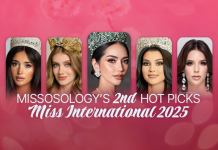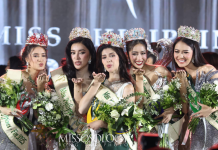In many societies where racial diversity is prevalent, a victory from the minority in fields such as beauty pageants are hailed as historic and a milestone. We always here so much praises for the first Miss USA of color or Miss Finland with darker skin tone. In fact, they can sometimes be politicized for added impact such as how Carolina Indriago used the race card for saying that she is the first Miss Venezuela of color (in fact she was asked about this during the finals).
But Fiji, a small kingdom in the South Pacific, is an interesting case. Consider this – its first ever Miss Fiji pageant saw the victory of Torika Watters whose skin is as white as New Zealand snow. Considering that Fiji is 55% Melanesian (Pacific Islanders with darker skin tone) and 38% Indo-Fijian (descendants of workers from the Indian-subcontinent), having a white Miss Fiji at its first-ever contest drew strong criticisms.
The uproar however was dampened after it was found out that Torika is ineligible to compete at Miss World due to her age. Koini Elesi Vakaloloma, the first runner-up became her acceptable successor. Lately though, the Miss Fiji contest has been on an interesting trajectory. It’s winners lately, Britanny Hazelman who competed at Miss World 2015 and now Pooja Priyanka who will compete on Miss World 2016, do not really represent the race of those of the majority of Fijians.
Now one might say that racism is a two way street and that the minority should be accorded with the same chances as the majority. That may be so, but this is Fiji. It is a nation that has visible racial fault and the coup d’état launched earlier this century is a manifestation of simmering discontent among Melanesian.
The majority of Fijian population, those who are native Melanesians, have long complained that they have been sidelined in various sectors such as in politics and in business. If the Miss Fiji contest will continue to favor the beauties of those in the minority over those of the majority, it could be targeted and labelled as one of the institutions that perpetuate the oppression of the native population. The Miss Fiji organization should understand better that the conversation of race in Fiji after all is quite difficult and it all starts with the definition of what makes one a real Fijian.








Comments are closed.